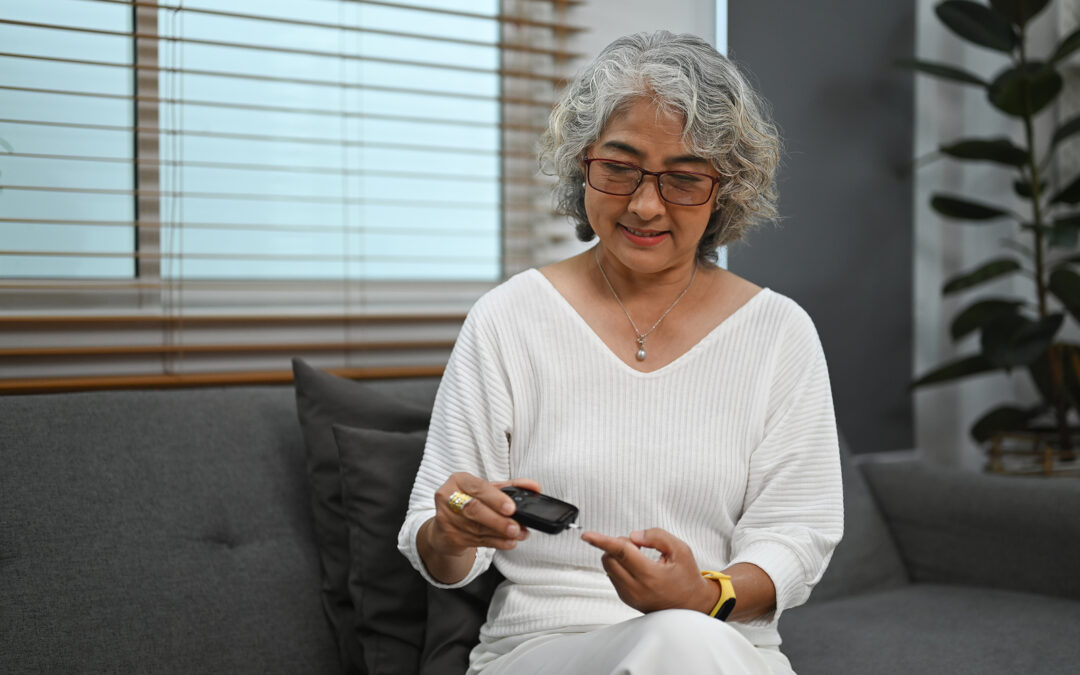Did you know that people with diabetes can be more than twice as likely to experience hearing loss? Studies show that there is a significant link between diabetes and hearing loss. Participate in American Diabetes Month by scheduling an appointment to have your hearing tested.
How common is diabetes?
Nearly 1 in 10 people have diabetes in the United States, making diabetes a major chronic health issue that people navigate today. According to the Centers for Disease Control and Prevention (CDC):
- 38 million people have diabetes in the United States.
- 1.5 million people are diagnosed with diabetes every year.
- 1 in 5 people who have diabetes don’t know they have it.
- 96 million people (over a third of all adults) have prediabetes and 8 out of 10 of them don’t know they are prediabetic.
Diabetes can affect health in significant ways including increasing health risks like heart disease and kidney failure. Research also shows that diabetes can increase the risk of developing hearing loss – a chronic medical condition that reduces capacity to hear and process speech as well as sound.
Can diabetes cause hearing loss?
While we don’t know if and how diabetes can cause hearing loss, we do know that there is a major link between both conditions. Studies show that diabetes can significantly increase the risk of hearing loss. A landmark study that examines this link was conducted by researchers at the National Institutes of Health. This study involved 11,405 people who had their hearing health as well as diabetes assessed. Participants included people who had diabetes and people who didn’t. Researchers found that among adults with diabetes:
- 21% experienced a mild or greater hearing loss of low or mid-frequency sounds compared to 9% of adults without diabetes.
- 54% experienced a mild or greater hearing loss of high-frequency sounds compared to 32% of adults without diabetes.
- Adults with prediabetes had a 30% higher rate of hearing loss
These findings highlight that adults with diabetes were more than twice as likely to experience hearing loss of low to mid frequency sounds. Lead researcher, Catherine Cowie Ph.D., said that “hearing loss may be an under-recognized complication of diabetes. As diabetes becomes more common, the disease may become a more significant contributor to hearing loss.”
How does diabetes impact hearing health?
More studies are needed to identify how exactly diabetes impacts hearing health. Experts do have a few suggestions that highlight how these two conditions can be linked. Diabetes involves either the body not producing enough insulin (Type 1) or the insulin produced isn’t used properly (Type 2). This causes excess glucose to remain in the bloodstream which can damage blood vessels and nerves in the body including the inner ear which houses the auditory system.
There are thousands of sensory cells in the inner ear which play a major role in how soundwaves are processed. These cells convert incoming soundwaves into electrical signals which get carried to the brain. The brain continues processing these signals which also involves assigning meaning to them, allowing us to understand what we hear. Damaged blood vessels can affect blood flow as well as weaken sensory cells, preventing them from effectively processing sound waves. This results in the brain receiving less auditory information, causing chronic hearing loss.
How can I protect my hearing health?
If you have diabetes, prioritizing care for your diabetes is key. This involves talking to your doctor and knowing what your target health levels are and how to best reach those goals. Specifically:
- Know your target for blood sugar levels and be sure to not exceed target levels.
- Keep blood pressure levels low.
- Prevent cholesterol from building up which can clog blood vessels.
- Quit smoking which increases health risks and affects blood flow.
Be sure to discuss these health factors with your doctor and ways you can stay on top of your health.
Are there additional tips I can practice?
In addition to prioritizing care for diabetes, there are several tips you can practice to protect your hearing health including:
- Test hearing every year so you can monitor your hearing health.
- Increase physical activity by taking a daily walk which promotes circulation and blood flow.
- Reduce exposure to loud noise by wearing hearing protection (headphones, earplugs).
Contact us to learn more about how you can protect your hearing health. American Diabetes Month is a great reminder to also schedule an appointment for a hearing test.


